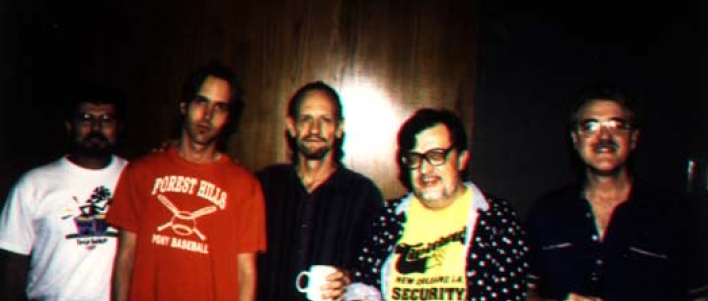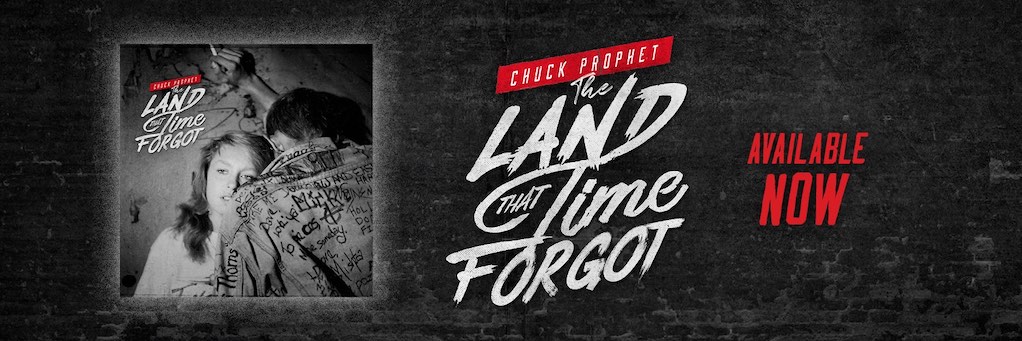
Jim Dickinson (1942 - 2009) R.I.P.
(PICTURED: Left to right: David Hood, CP, Calvin Russell, Jim Dickinson, Roger Hawkens)
Have faith in the process. Trust the producer. Listen to the songs. Never, NEVER, stop rolling! Don’t answer the phone in the studio, it could be the company telling you to stop! Don’t let anybody make you feel bad about what you’re doing. You can burn out but that doesn’t mean you can’t get lit again. I’ve seen in happen.
- Jim Dickinson (1942 - 2009)
I just learned that Jim died. I’m punched in the chest.
Jim’s presence here may be gone. And it was a big presence. But his music, his spirit? Well, hell, you know how this sentence ends…. I’m sad. Deeply. But the memories that swirl tonight under the ceiling fan aren’t sad at all.
Jim’s health hadn’t been good for some time. I reached out to his son Luther last week to see how Dad was doing. They were preparing for a benefit show for Jim and Luther sent me a text, “Dad woke up at midnight after sleeping all day, and started barking orders. Still producing!”
Dickinson: you might know him as the guy who produced Big Star’s 3rd, or the guy on the back of the “Paris, Texas” soundtrack rolling what looks like a round of duct tape across the keyboard of a Steinway grand piano (they opened tuned that piano, by the way. “It took days!”). Or playing with Dylan. Or maybe you know him as the man who played those three notes of tack piano on the Stone’s Wild Horses. Jim was a magnet. The people that stopped by the sessions were unreal. Sputnick Monroe? Sure. And Ry Cooder coming by and sharing a chat with us. Casually picking up every one of the 15 guitars laying and playing a half riff. Always searching.
He was a sensitive man. But full of mischief and fun. Corny as it sounds, he was like a father to me. I was definitely a student. I always feel his presence. He left his mark.
Jim was also a dedicated man, dedicated to the art of record producing and to his family. He believed making records was a fight of Light vs. Dark—but he refused to work Saturdays so he could watch his Memphis Wrestling on TV. A tangle of contradictions, his gruff exterior never hid his huge heart.
As a producer, when he sensed that Green on Red lacked faith in ourselves, fearing it was all hollow, a scam, Jim said, “Never let anybody make you feel bad about what you’re doing” . He offered belief. And made you feel your work was important. It was clearly important to him. What a gift he gave us.
Makes sense that Jim once wanted to teach history. Every session, every van journey, was a history lesson with Jim. Often in the morning of a session—and Jim was old school: he was punctual—Jim would play music to inspire us. Might be scratchy vinyl of Kerouac recitations, or Mac Rice demo’s on 7” reels he’d cribbed from Stax. (Tina the Go Go Queen was on there.) Or Black Oak Ark sessions Jim produced back when Ardent was still 8 track. Back when Jim engineered. “Sure, I used to go out and do the hand claps with the band.” It was all part of our extended education.
I made several records with Jim, including two-and-a-half Green On Red slabs, and the odd session Jim hired me for. With my band, we backed Jim on a live record. Jim had been a constant presence in my life. A mentor. A friend. Just the other day a Radio 6 DJ accused Jim Dickinson of producing my last record. She was wrong, but I said, “Yeah, well, it’s like he’s always in the room.” I told the truth. “Jim was always excited about new music. He loved The Cramps. He never got old.
“Yeah, you’re right this Johnny Dowd record is DANGEROUS. Gives me faith it can still be done this late in the game, Chuck.”
Some of my favorite Dickinson memories:
Green On Red picking Jim up at LAX back in 1986 or so, to take him to the studio. Jim mentioned he’d like some weed. No problem. We took a slight detour to Alvarado St. where you hold a ten dollar bill out the window and a kid runs off with it. Out of nowhere someone lowers a basket from a rooftop on a fishing pole with a bag of weed in it.
Jim later said to me, “Boy, you guys. I have to say I was really impressed.”
How happy Jim was when Dylan started performing Across the Borderline in concert? “Bob Dylan singing MY words!”
On over-dubbing the solo on GOR’s Morning Blue: “Come on Chuck, grow up, play something cohesive!”
Over-dubbing the backing vocals on GOR’s Zombie for Love, Jim said “make it sound like one of the black extras for the cheap horror movies: Eye’s a S-s-s-s-ombie/Eye’s a S-s-s-s-om-beee”. With Dan Stuart singing, Dickinson playing drums without sticks but those paint stirring things from the hardware store instead.
On showing me his version of Shake Your Money Maker, I asked ‘Is that on Elmore’s version Jim?’ “Hell no, that comes from the Fleetwood Mac version. It SMOKES over Elmore’s” . The immortal Jim Dickinson: Fleetwood Mac could smokeElmore James.
The biggest honor (but I was mighty honored when he covered my songs) was that I was his first one in—calling me as soon as he got back from the Time Out Of Mind sessions. Sharing Dylan stories; Dylan needling Lanois: “Maybe if I took some more advice on how to sing I’d have a career by now.” On the passing of Sam Phillips: “They say God created all men equal. Still, I think God created Sam with just a little extra.” On tuning: “Tuning is a decadent European habit bordering on the homosexual.” Said with no malice, just his grin. And again on tuning but years later: “This auto tune is great. I’d run the drums through it if I could.”
On producing the Replacements: “Did you know Paul Westerberg wears make up?”
In the studio producing—David Hood and Roger Hawkins were the rhythm section—listening to those guys reminiscing about the Stones at Muscle Shoals. Hood: “Who was that chick with the camera that hung around?” And Hood again: “Jagger wore the same clothes five days in a row. Until Wexler showed up and Jagger came out of the hotel elevator wearing that white suit.”
Jim giving me a white label copy of Big Star’s Sister Lovers. There weren’t really cassettes back then. Ardent pressed up white label LP demos to try and get a deal for the cracked masterpiece that wasn’t to come out until years later. They even sprang for a tailored suit and sent Jim out to LA to play it for some A & R people out there. Jim showed up one day to a session wearing a colorful scarf and I asked where he picked it up. “That’s about all I have to show from Sister Lovers” . On the acetate he gave me he wrote in his inimitably crude style with a felt pen: “Big Star Sister Lovers—- produced by Jim Dickinson. Eng. John Fry. NOT 4 SALE.”
Rehearsing with Jim for a couple of gigs that later turned into the Thousand Footprints in the Sand live record, I asked, “Is that a major or a minor chord you’re playing there?”. Jim looked down studied his fingers at the keyboard and said, after a pause, “I don’t know, I just kind of float it.”
Once when Dan Stuart and I made the trek to Hernando for dinner at the Dickinson house: Jim said, “I was hoping you might be willing to go down in the basement and fuck with my kids”. And so we did. Went down there and fired up the Marshals and jammed with Luther and Cody on some thrash metal. When we resurfaced, Jim was really pleased. Just beaming. Jim and Mary did something right, because they raised two boys who are a couple of the kindest and most gentle men you’ll ever meet.
That was a long time ago. The dot where Memphis is on the map became a tunnel and a journey and a life’s work. And now the new heroes are the business men. It’s a mixed up shook up world. Indeed.
Don’t answer the telephone in the studio, it could be the company telling you to stop…
God bless Mr. Jim Dickinson. God blessed us with him.
—Chuck Prophet, Baja California, Mexico, August 2009



